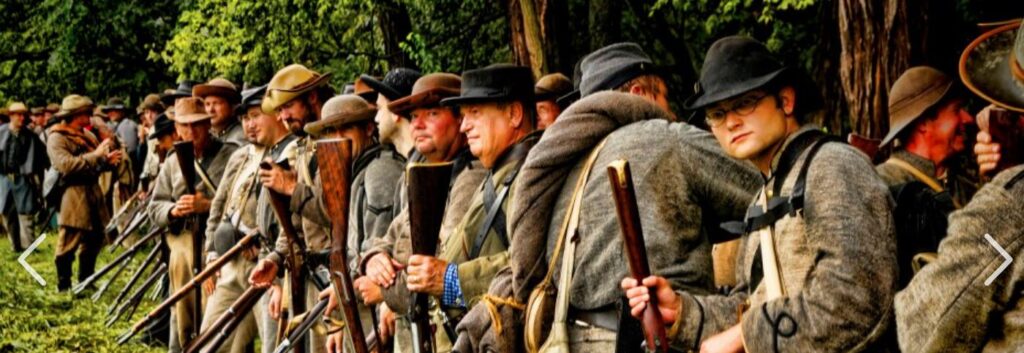by Donald Smith
When we think about wars, we often think of the great commanders who led the armies and navies that fought those wars. Mention World War II, and names like Eisenhower, Halsey, Rommel and Yamamoto come to mind. If you think of the American Revolution, quickly you’ll find yourself thinking of Washington, Cornwallis, Greene, etc… And, especially in Virginia, if you think about the Civil War, Stonewall Jackson will most likely cross your mind.
We remember generals for their leadership and decisions — but we also remember them for the armies they trained and led. It was the armies that won the great victories, not the generals. Patton didn’t rescue the 101st at Bastogne*; his Third Army did. Eisenhower didn’t take Omaha Beach; the survivors of the 29th Infantry Division (and many other troops) did. In that sense, the generals serve as symbols of the men who fought under them. The legacy of the general is intertwined with the legacies of the thousands of men and women he commanded.
One of the reasons that VMI’s handling of Stonewall Jackson’s legacy is so disappointing, is that it has impacts beyond Stonewall himself. Jackson has a personal legacy, as a person, a teacher and a battlefield titan. But he is also the most visible symbol of the army command he organized and led to victory after victory in the Civil War. A command which fought from First Manassas to Spotsylvania Court House, and is one of the most famous in American military history—the Stonewall Brigade.
The Stonewall Brigade, formed by Jackson on April 27th 1861, was filled with soldiers from the Shenandoah Valley. The 2nd Virginia Infantry Regiment was made up of men from Clarke, Frederick, Jefferson and Berkeley Counties. The 5th Virginia had men from Frederick, Rockbridge and Augusta Counties. The 7th Virginia Cavalry was organized in the Shenandoah Valley. The 4th and 33rd Virginia were originally organized in Winchester. Stonewall had artillery units from Winchester, Augusta County, and Lexington itself — the famous Rockbridge Artillery, with a heavy complement of Virginia Military Institute men in its ranks.
For thousands of men who came from the hills and farms around VMI, the most dramatic experience of their lives was their service in the Stonewall Brigade, and Jackson’s Army of the Valley. They were heavily engaged in many of the Civil War’s greatest battles — First and Second Manassas, the Valley Campaign, Gaines Mill, Cedar Mountain, Antietam, Chancellorsville, Gettysburg, the Wilderness and Spotsylvania. The vast majority were neither slaveholders nor plantation owners, and many were in the Confederate ranks unwillingly. (The Confederacy instituted conscription early in 1862). But they fought, suffered and endured years of war together. Once the war ended, most returned to the Valley. Many of their descendants still live there, in the counties around VMI. Among those descendants, there is a high level of pride for the courage and dedication their great-great-great grandfathers showed.
To outside observers, it might seem there’s been a fair amount of overkill in the public adulation for Stonewall Jackson. But, much of that adulation was not just for Jackson himself. It was also for the men who followed him. Men who, after the war, raised families in the Valley. To those men and their families, Jackson was a symbol of their own determination, heroism and sacrifice.
So, when the powers-that-be removed Stonewall Jackson’s statue from VMI Main Post, and then decided to erase virtually every sign of Stonewall from Main Post, it’s not just the descendants of Jackson himself who felt it. Maybe Jackson’s legacy doesn’t matter to the faculty members at VMI or Washington & Lee, or to the wanna-be sophisticates who proliferate in college towns like Lexington. But, when you get outside of the trendy spots in modern-day Lexington, or away from the places where they adore The Washington Post, MSNBC and Stephen Colbert, you’ll find a fair amount of folks who take all this personally. No one likes to see their ancestors disrespected.
Those folks are not moved by assurances that the transfer of Jackson’s statue to New Market was a way to “honor” him. (There’s a saying that’s older than Stonewall himself — don’t pee on my leg and tell me it’s the rain.) And, they’re not pleased to see Stonewall dismissively characterized as an insignificant man, who should be remembered primarily as a poor teacher and (to paraphrase the Post), an “enslaver of six people.” (They also wonder what makes modern-day critics of Stonewall think they’re qualified to pass judgement on him).
VMI’s treatment of Jackson’s legacy sends a clear message that that legacy is no longer welcome on VMI Main Post. That legacy, though, is about more than the life, character and accomplishments of only one man. Stonewall Jackson’s statue, and his legacy, are symbols of much more than that. They’re symbols of the brave men who followed Stonewall through years of hell, then returned home, rebuilt those homes and farms, and made the Shenandoah Valley the wonderful place it is today. Men whose descendants banded together with their fellow Americans in the North and West, fought and won two World Wars and made America a great country. The 116th Infantry Regiment, whose lineage includes the Stonewall Brigade, became part of the 29th Infantry Division — the “Blue and Gray” Division that fought heroically at Omaha Beach.
It seems that VMI is more concerned about appeasing the “woke” community, than respecting the real-life communities in the counties that surround it and have supported it for years.
Donald Smith is a graduate of the University of Virginia and the Joint Military Intelligence College. He was raised in Virginia. He is keenly following VMI’s handling of the legacy of Stonewall Jackson. He plans to comment on how that handling has implications for VMI’s reputation and Virginia’s heritage and culture. He “intends to fight it out on this line all summer.”
* I stipulate that the 101st didn’t feel that it needed to be rescued—and still doesn’t.



